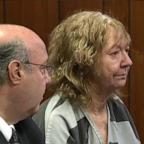Breast Cancer Gene Tests for Girls: Too Soon?
While some parents opt to have their daughters screened, others balk.
June 5, 2008— -- For Ellyn Davidson, there was only one thing scarier than being diagnosed with breast cancer. It was the prospect that her 8-year-old daughter would one day receive the very same devastating news.
"At the time of my diagnosis, she definitely was one of my first thoughts, but it never occurred to me that I could be carrying the mutated BRCA gene," she recalls.
Yet, despite her fears, Davidson adamantly refuses to have her young daughter genetically tested for the gene mutation.
"I would never have her tested until she was at an age where she could do something about it," she says. "I would likely start thinking about it somewhere around 18 to 20 years old for her."
But for Scarlett, a North Carolina mother who asked that her real name not be used, waiting was never an option. Scarlett had her daughter tested when she was 4 years old.
"When my husband's mother tested positive, we had him tested because there are ramifications for men, as well," she says. "We had him tested about a year and a half ago. He came back positive, so I decided to have my daughter tested, and she and my husband are both BRCA1 positive."
While every woman is born with the BRCA1 and BRCA2 genes -- perhaps the two most notorious breast cancer genes known today -- women, like Davidson, are part of a minority population of women who carry a mutated form of the gene that they inherited from their mother or father. These women are at much higher risk for developing breast cancer.
So, if you were a woman with a strong family history of breast cancer, would you want your young daughter tested? It is a question facing many women, as genetic testing for hereditary breast cancer becomes increasingly popular.
One simple blood test which screens for the mutated BRCA genes, and women could know their possible future, or perhaps more importantly, their daughters'.
So, why are so many mothers across the country opting out of having their young daughters tested? For Davidson, 37, it's a matter of bad timing.
"At this point, I just don't see a reason to make a child worry about something like that," she says. "She has a 50 percent chance that she's carrying the gene, but we will test when she's the appropriate age."
Current guidelines from the National Comprehensive Cancer Network indicate the "appropriate age" to begin screening women at high risk for the development of breast cancer is 25, or at least five to 10 years before the earliest breast cancer in the family.






